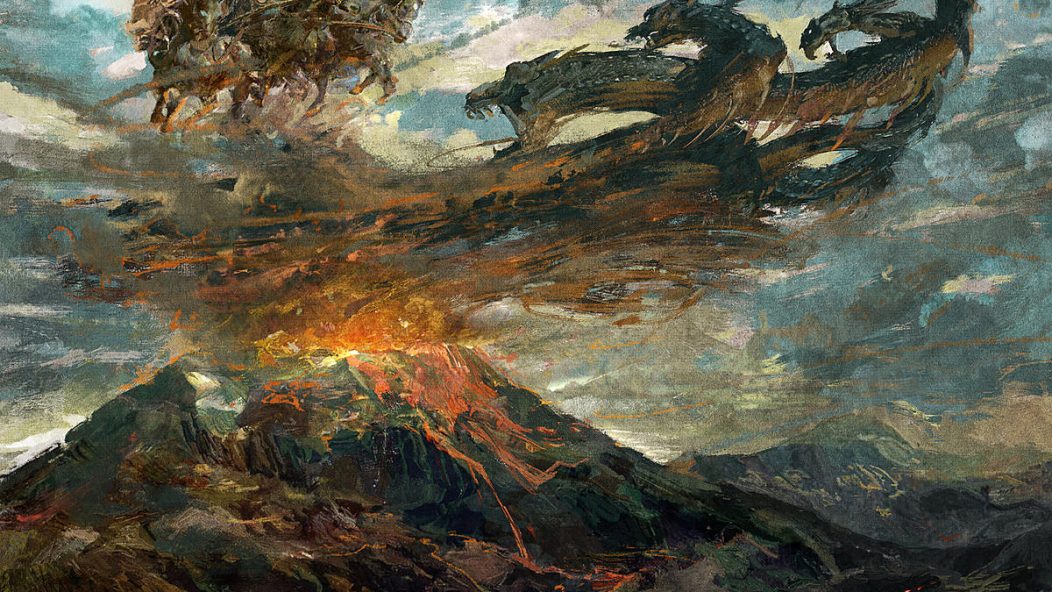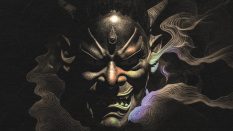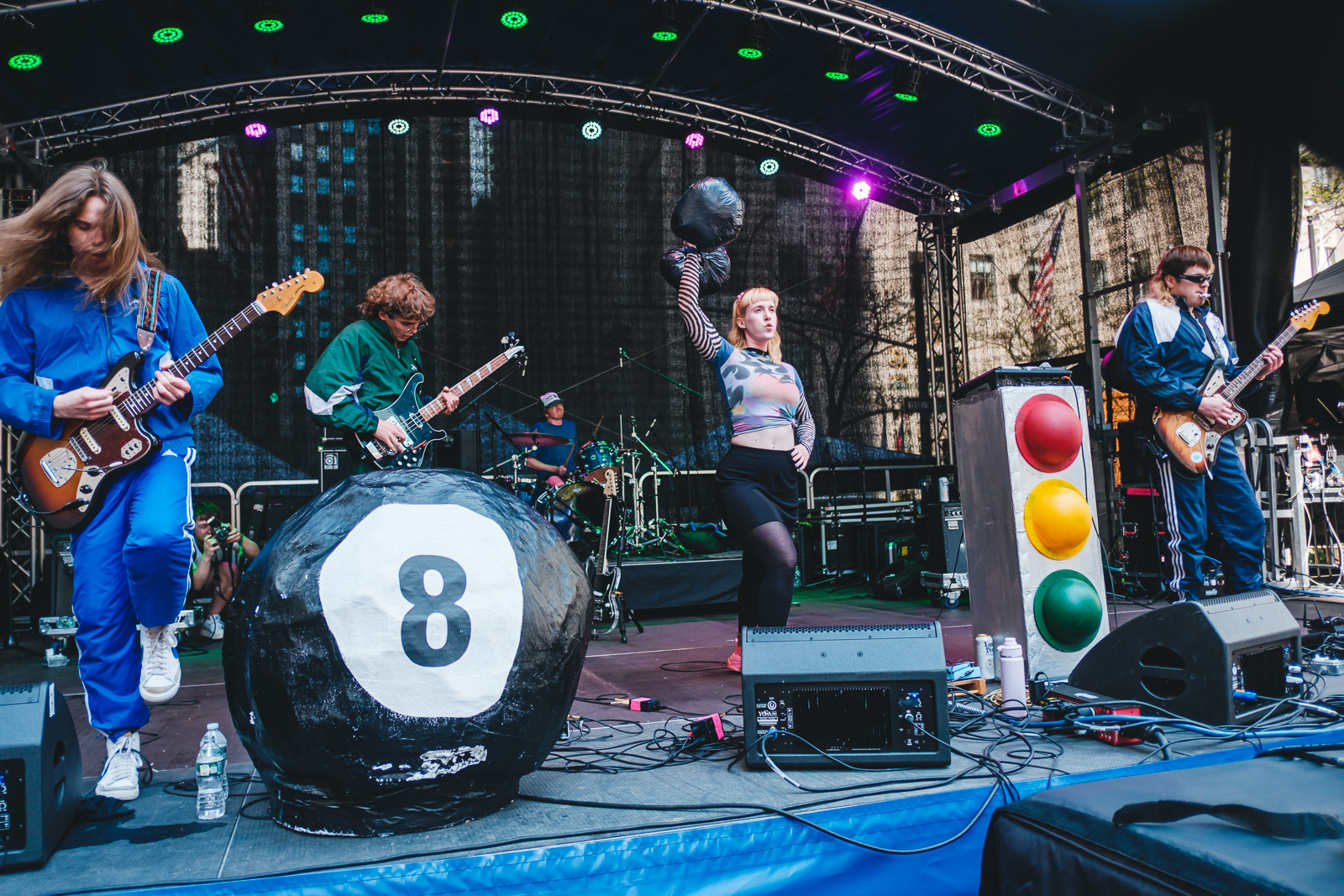
"Even the Demons" Fear Craven Idol's Black Thrashing Might (Early Track Stream + Interview)
Since Craven Idol’s debut demo in 2006, they’ve consistently put out a new release every three or four years. Given the release of The Shackles of Mammon in 2017, it was about time for a new record, and the English band has delivered with their third studio album Forked Tongues coming out this summer.
The wicked sounds of Bathory and Sodom, as well as the touch of old heavy metal, are shockingly under-represented in modern black/thrash given their importance to the development of the sound. Craven Idol’s stark adherence to the ancient days of evil metal and to pure Armageddon as such render them a welcome return to hellish witching might. Though the band is certainly turned towards the past for inspiration, the music itself is not at all dated, and any and all fans of devastating black thrash attacks will find something to dig into here.
Each riff slices with precision, and none overstays its welcome; a single riff can repeat for quite a while to build atmosphere or a sense of the epic, such as the main riff on “Venomous Rites,” but Craven Idol know their craft enough to know which riffs deserve that treatment and which don’t. Their drummer, Heretic Blades, also has a sense of dynamics that allows many unconventional songwriting choices to flourish that might not with a weaker group. His changing beats and vicious pummeling on the kit propels many a riff to heights that a weaker drummer could not allow, and choice sections of lead guitar as well as catchy vocals help make any section work perfectly.
Consistency can be a rare beast in black/thrash, with many bands folding or abandoning the sound after a record or two, but Craven Idol’s quality has remained at a high peak across the years and their continued allegiance with underground tastemakers Dark Descent Records should prove to wary fans that this is an idol worth buying a bit in advance.
Below we’re premiering “Even The Demons…” from Forked Tongues, as well as an interview with Sadistik Wrath, the band’s founder, guitarist, and vocalist. This particular track is one of the best from the record and a perfect example of both the more epic tendencies that I mentioned up above as well as their tendency towards an ‘80s ethos of riffs that are forever ripping fast. Cold, aggressive, and tormenting, “Even The Demons…” will destroy you.
…
…
The two longest songs that the band has ever written are the two closers to the new album, “Deify the Stormgod” and “The Gods Have Left Us For Dead.” Did you always intend for it to work out that way?
No intention as such. The songs really take on a life of their own after a while. I don’t see how they could have panned out any other way. We pride ourselves for our song writing and forging complete pieces, rather than reverting to predictable and overdone chorus-driven narratives.
On the other hand, the album tells the tale of Typhon’s return in chronological order, so the track-listing of songs was set early on in the process. There is something to be said for ending albums with longer tracks. Like any great story they are an accumulation of everything that came before… the climax if you will. Only by listening to the whole piece does the ending make sense.
When you’re putting together these long beasts do you put any thought towards how they’ll fit and flow on a vinyl record?
It’s an interesting question. I suppose every song starts with a riff or two and then evolves. Some riffs just happen to be hybrids of sorts and deserve to be played over several different moods and beats. Songs tend to grow from there, as we spent countless hours playing just one riff and learning to understand what it needs… what it is and what it can become. It’s also essential to not merely glue parts together in pandemonium, but to keep the eye on a complete coherent song, with just enough repetition for every moment to have a meaningful impact. How many times have you heard a great riff only for it to disappear after 4 bars… or how often has a riff or chorus been repeated so many times it drove you mad? It’s a subtle balance…
As for vinyl, having a coherent A and B side is essential. It’s the only physical medium I listen to, so I think almost exclusively in those terms. The A side of the album presents the return of Typhon, whilst the B side focuses on Zeus’ fall and Typhon’s terrible reign. Song wise it is descent from fury, glory, and rebirth into terror, oppression, and death. The two last numbers really hammer on the point of self-orchestrated doom by mankind. Typhon (ultimately a mere figment of imagination) leads us to extinction. To these ears, the flow of the songs is perfect, as the album ends with two challenging yet grandiose songs… burning out, not fading.
Did the idea to have the album be conceptual come before the songs started coming together? How early on did you decide to have it be about Typhon’s return?
Very early on. We started writing Forked Tongues before The Shackles Of Mammon was even released. Already back then, I had started studying the Titanomachy and stumbled across Typhon, the most fearsome of all the Titans. We wrote “Wrath of Typhon” and “Venomous Rites” very early in the process, after which there was no turning back. Of course, with only two songs written that meant the whole album needed to be mapped out in advance. There had to be a song about the battle between Zeus and Typhon, as well as a song about Typhon’s subsequent victory and universal reign. Curious listeners can follow the booklet’s notes as they listen – just above each song’s lyrics the events of the chapter is summarised, for example the song “Forked Tongues”: In which Zeus is defeated, rent limb from limb, and plunged deep into the raging torrents of Phlegethon, the river of flame. It’s a method I first discovered in the works of Grimmelshausen (17th century German Baroque author).
The significance of lyrics in extreme metal is often debated. To some they are part of the noise, another instrument of sorts adding to a sonic assault, whilst others read every word and understand the album on a whole different level. I’ll be honest, I’ve been in both camps a million times. However, when writing music lyrics, or even just a song title are essential for creating a mood or let’s say atmosphere. It’s similar to reading a book of dark sci-fi or staring at a classical painting. It devours you if you let it. And that’s what I aim for when writing for Craven Idol. I’m at least just as influenced by books as I am by music.
Do you try to integrate the lyrics in with the songwriting directly? Perhaps a “swinging” or “cutting” riff at the appropriate moment of a battle, a drum beat that matches the march to battle…
For this album the lyrics and music are truly one. Everything was written in unison after we decided to embark on this conceptual journey. That said, the song comes first and we would never sacrifice a song’s integrity to fit something in. Writing in itself is about problem solving after all… there’s always another way. The battle itself takes place on the title track, easily the most fierce number on the record. The intensity of playing and in particular lyrics goes up here quite deliberately as the album races to Armageddon.
On the song that’s being premiered today there’s some killer lead tremolo melodies over the rhythm guitar that help elevate the song significantly. Do you write those before the rhythms, or do they come in selectively where needed later in the process?
Rhythms tend to come first with lead guitars adding to the whole. Even The Demons… was written to have a constant upward trajectory as far as intensity is concerned. The leads act as tools in building up tension in the song, and are it’s paramount they are in the right place. Lyrically this is where Typhon sets the world aflame as a bloated and disinterested Zeus hides on Mount Olympus. However, the pressure builds to boiling point and the god is forced to act.
Across the years you’ve walked a sometimes-fine line between bands, with many of the same influences being apparent, particularly between Scythian and Craven Idol. How do you maintain that separation while songwriting? Is it ever a struggle?
It never is. To me, the bands don’t really sound alike, despite fairly similar influences. All bands try to do fairly different things musically… summon different emotions. It’s important to have different players involved as well. Scythian began largely as A Von M’s band… so his guitar style is all over that one, whilst Craven Idol was formed as a rawer more inherently old school racket.
As for my other bands, Phaethon are old school epic heavy metal and I don’t write music for Crom Dubh.
The band’s lineup has been the same for a few years now and the band has maintained its partnership with Dark Descent Records since the debut album. Is that sort of consistency important to you or is it happenstance?
The partnership with Dark Descent Records was born when I mailed Matt the album. We really haven’t looked back since and the thought of switching hasn’t even occurred to us. To my mind, they are the best underground label around, so we are stoked to be a part of it!
The lineup is a somewhat different matter. When other founding guitarist Scourger left after Towards Eschaton, I wasn’t sure we should continue. But when Suspiral, Heretic Blades, and Obscenitor kicked into gear, we knew it was worth it. Lots of bands overstay their welcome, churning our formulaic and lazy records… it’s important to recognize when there is nothing more to say… or reinvent oneself.
With Forked Tongues, our longevity came to fruition beyond our wildest expectations. After touring a month-long European tour with Mystifier we felt as close-knit as ever, so entering the excellent Vagrant Studios felt like a continuation of the same. We truly cherished the live sound on the record and everyone’s pushed themselves in their performances.
So in retrospect, I would say consistency is incredibly important. Ha!
Had you ever done any touring as intensive as the stretch with Mystifier before?
The Mystifier tour was unlike anything we had done before. We’d played abroad plenty of times and embarked on some mini-tours, but nothing of this calibre. Mystifier are pioneers of black metal, and it was an honor to not just tour, but get to know them over the month’s trek. Starting to the Czech Republic, we crossed Europe and finally the road concluded to Rome. Touring is one of the best parts of band life, so we are hoping to hit the United States next year for a similar jaunt, but who knows in these troubled times.
Do you want to do similarly aggressive tour schedules going forward, pandemic willing? Who else would be ideal tour partners?
A similar schedule would be preferable. All of us love touring, so the more the better really. As mentioned, hitting the States would be ideal, hopefully one of the coasts. As for touring partners, any Dark Descent band would be brilliant. We have been friends with the lads from Grave Miasma since our teens, so that might be good laugh!
You mentioned earlier that you already started work on this album before the prior one was out. Are you already hard at work on the next big thing?
Forked Tongues was the hardest album we have written (I would also say by far the best, but then that’d be incredibly cliché). It took a lot out of us, so we have opted to take it easy before starting work on new material. It is also an incredibly difficult album to follow up. Time will tell if we can rise to the challenge.
…
Forked Tongues releases July 23rd, 2021 via Dark Descent Records.











